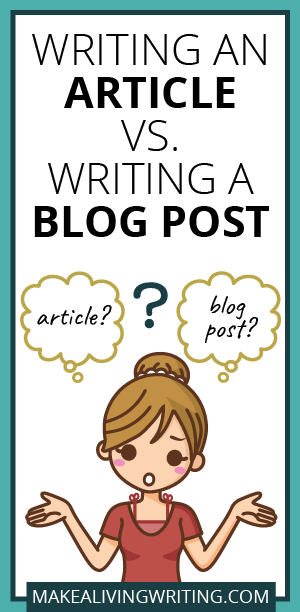
Enjoy! -Carol.
There’s a lot of confusion out there in the freelance-writing world today about blog posts and articles. Also, about what each of those types of writing should pay.
Recently, I got a lot of response to my call for freelance writers to stop writing blog posts. Many writers were confused about just what the difference is.
So let’s discuss. Because things are changing. And understanding the differences between these two writing forms will help you earn more.
For years, blog posts and nonfiction articles were distinctly different:
| Blog Post | Article |
|---|---|
| Mostly your own opinion | Your opinion not allowed |
| No interviews or research | Has interviews and research from credible experts and research firms |
| Short | Longer than 300 words |
| Built around SEO keywords | Keywords not important |
| Good spelling and grammar optional | Spelling and grammar are impeccable |
| Casual writing style | More sophisticated writing style |
| No editor involved; self-published | An editor cleans it up for you; published by a print magazine |
| Freelance pay rates usually very low; much work in the $5-$20 per piece range | Pay rates from $.10-$1 a word and up |
Then something happened, and over the past couple of years, the lines started blurring.
Blog-article convergence
Blog posts started to get more and more like articles. As a bazillion blogs crowded the Internet, the bar began to raise.
Blog posts began to have more interviews. They presented interesting data. Posts got longer as bloggers sought to stand out and deliver more value, until 1,000 words has become fairly standard, and 2,000-word posts are not uncommon. SEO keywords’ value lessened as Google cracked down on keyword-stuffed content. Also, as blogs got more professional, many hired editors.
On the article-writing side, there was also movement. Many print magazines began posting copies of their articles online. Suddenly, magazine headlines needed to drive traffic, just like blog-post headlines, and headline styles evolved. They published more opinion-driven pieces from thought leaders. Some also put up blogs where they let writers hit the ‘publish’ button on their own.
Wordcounts shortened for print, as ad revenue migrated online. Some magazines went online-only. Their style got breezier and more casual.
To sum up, the two types of writing began to merge into one. Definitions got squishy, and now there’s a lot of confusion.
Except about one thing: Blog posts tend to pay crap, and articles tend to pay better.
Client confusion
Uneducated clients who don’t really know these two forms have been busy muddying up the conversation about them for years. That’s made it hard for writers to define writing projects and bid them appropriately.
There are plenty of clients out there who call the 300-word quickie posts they want ‘articles,’ but still want to pay $5 for them.
There are also many clients who’d like you to write 1,000-word blog posts with two interviews and a research stat, but they’d like to pay $20 because “it’s a blog post.”
Your job as a freelance writer is to cut through the bull and get to what the assignment really is — then, talk about what that gig should really pay.
How writers can earn more
The fact is, clients are always going to try to get things cheap. It’s up to writers to educate clients about what they’re asking for, and what’s fair pay for what they want you to write.
The good news is, the convergence of blog posts and articles should offer writers better pay opportunities. Blog posts are growing up — they’re increasingly not the ugly stepsister of articles. So they ought to pay more like the articles they often are.
But it’s up to the writer to take the steps to capitalize on this change in the marketplace.
Some suggested steps:
- Define it. When a client tells you they want articles, or they want blog posts, ask them to define what they mean. Are there interviews involved? How many? What’s the piece length?
- Sway them. Sell them on the idea that what they want is considered an article by pro writers. It’ll instantly boost your rates. Make your case for why it’s an article gig.
- Sell articles. When you’re talking to clients who don’t quite know what they want, sell them on the idea that you should be writing an article for them, rather than a blog post, if they want their content marketing to be successful. Share the news of how Google is frowning on short keyword-driven posts.
- Sell blog upgrades. If they want posts for an existing blog, sell them on the value of taking their blog to the next level, to more of a reported-story, magazine-type feel, and what that could do for their reputation and visibility.
Writing an article vs. blog: What to charge
Where most writers are lucky to get $100 a post for blog posts — and I recommend you try to make that your floor for blog writing — article rates are usually much better. I’ve written many at $300-$500, and many more at $600-$2,000, depending on length and complexity.
Many smaller daily papers pay in the $75-$100 range for short articles, but have the advantage of giving you more impressive clips for your portfolio. You also get the bonus of learning to report a story, which lays the groundwork for getting better-paying articles in future, from businesses or magazines.
Getting the win
The fact is, articles and article-style blog posts convey more authority. They impress more of your client’s customers. The projects will be more successful, and those clients will be more likely to hire you back to write more. It’s a classic win-win — you can charge more at the start, and will likely end up getting more work from the client, too, because they’ll be happier with the results they get.
This all sets you up to go after better-paying magazine markets, too, if you have that goal in your 2021 to-do list.
If you’re daunted by the idea of writing article-style blog posts or full-blown articles, learn more about writing articles.
The idea of finding experts, doing interviews, or vetting research freaks out some writers, I know. But trust me, you can learn this stuff. I learned it all on the job, by trial and error.
Do you have advice on article writing vs. blog writing? Let’s discuss on Facebook.










